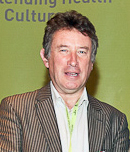Rural round-up - August 13
Keeping up the pace:
The Wonca Working Party on Rural Practice over the next triennium
The first of a regular monthly column from the WONCA Working Party on rural practice. This month, John Wynn-Jones, the new chair of the working party writes for us.
Find out more about the Working Party on Rural Practice and John Wynn-Jones.
Background
The World Health Organisation tells us that approximately half the world’s population live in rural areas and 70% of the 1.4 billion who live in extreme poverty are rural. Rural communities around the world are characterised by poor access to health care, aging populations and limited resources. The rural urban divide is marked by significant inequalities in health and social care and poorer overall health outcomes.
The WONCA Working Party on Rural Practice (WWPRP) has been one of the most prolific and productive working groups within WONCA since it was established at the 1992 Vancouver WONCA World Congress. Much still needs to be done but the growing international rural movement has succeeded in raising awareness of the inequalities that exits and ensuring that rural is clearly now on the world agenda.

The seemingly relentless drive to centralise care in large centres with growing specialisation further isolates those rural residents who need health care. Rural practice is and should remain the last bastion of true generalist care.
As one of the founding members of the WWPRP, I feel that it has been a privilege to have been associated with so many committed rural colleagues across the world and as I now take on the role of the chair for the next three years, I intend to ensure that we remain committed to our goals and the pace does not slacken.
The working party’s website contains a comprehensive list of our policy documents, declarations and publications which cover all aspects of rural family practice. (http://www.globalfamilydoctor.com/groups/WorkingParties/RuralPractice.aspx). Rural practice throws up many challenges for doctors, policy makers and isolated communities. We in the WWPRP believe that we can help by ensuring that working rural practitioners and academics can work together to advise and influence educational institutions, national associations and strategic planners on rural issues. It is our belief that quality care can and should be available to all people regardless of where they live.
Future activities
I am now planning our activities for the next three years. We will continue to run our successful annual world rural health conferences and we hope that as many of you as possible will join us in Brazil in May 2014 (www.sbmfc.org.br/woncarural)
Dr Bruce Chater and Professor Jim Rourke are joint editors of our planned electronic textbook on Rural Medical Education, which we plan to publish in the next 12 months. We aim to contribute a regular rural bulletin to WONCA News and you will hear more about our activities in greater depth over the coming months.
My three major themes for the forthcoming triennium include:
• The membership of the Working Party: We aim to ensure that we have genuine gender equity and we have already taken significant steps to meet our goals by inviting more women onto the working party and the executive. We also aim to ensure that younger doctors are represented and as a result we have stated to work with the five young doctor groups within WONCA.
• Relevance to working rural practitioners: The WWPRP represents working family doctors across the world and it is my intention that our activities remain relevant to the needs of these doctors. We plan to systematically review our previous policies and documents to ensure that they remain as relevant now as they did when they were formulated. We are also developing a communication strategy, which will ensure that we can communicate effectively with any rural family doctor who wants to engage with us. I have spoken with family doctors in the developing world who are sadly excluded from our meetings and conferences because they do not have the resources to travel. We must ensure that we are inclusive and truly responsive to these colleagues whose needs are often much greater than ours.
• Working within the WONCA family: Finally some of WONCA’s most precious resources are the diverse and committed working and special interest groups. We need to learn to work together and combine our skills, resources and energies to address the mounting challenges that rural practitioners face over the coming decades. The European rural network, EURIPA has successfully worked with the quality network (EQuiP), the education network (EURACT) and the research network (EGPRN) to run joint conferences and special projects. I propose that we foster similar relations with other working groups and we will welcome any suggestions or offers for future collaboration.
Please keep on reading our reports and join us if you can. If you are a rural family doctor then you will have something to contribute to the rural debate. Please contact me if I can help. ([email protected]) Our goal is to ensure that rural practice is properly represented in the heart of WONCA and that WONCA is responsive to the needs of the poorest and most needy wherever they live.
Dr John Wynn-Jones (UK)
